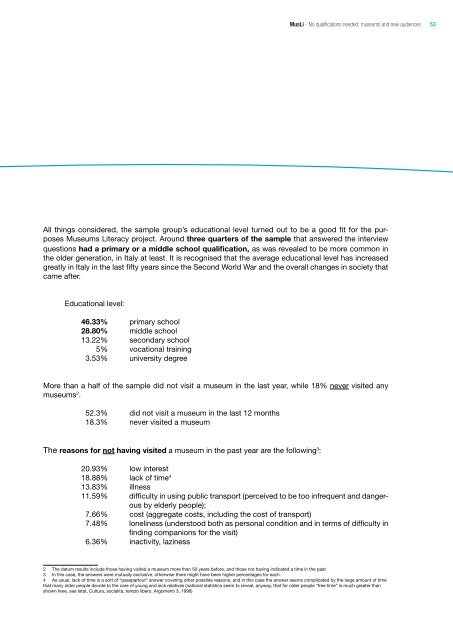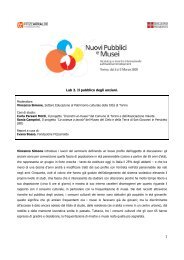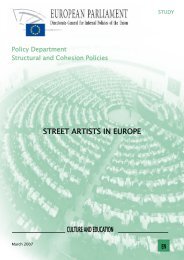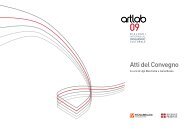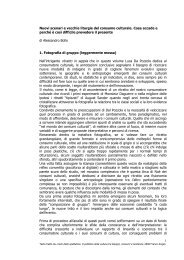MusLi (Museums Literacy) - Fondazione Fitzcarraldo
MusLi (Museums Literacy) - Fondazione Fitzcarraldo
MusLi (Museums Literacy) - Fondazione Fitzcarraldo
Create successful ePaper yourself
Turn your PDF publications into a flip-book with our unique Google optimized e-Paper software.
<strong>MusLi</strong> - No qualifications needed: museums and new audiences<br />
All things considered, the sample group’s educational level turned out to be a good fit for the purposes<br />
<strong>Museums</strong> <strong>Literacy</strong> project. Around three quarters of the sample that answered the interview<br />
questions had a primary or a middle school qualification, as was revealed to be more common in<br />
the older generation, in Italy at least. It is recognised that the average educational level has increased<br />
greatly in Italy in the last fifty years since the Second World War and the overall changes in society that<br />
came after.<br />
Educational level:<br />
46.33% primary school<br />
28.80% middle school<br />
13.22% secondary school<br />
5% vocational training<br />
3.53% university degree<br />
More than a half of the sample did not visit a museum in the last year, while 18% never visited any<br />
museums 2 .<br />
52.3% did not visit a museum in the last 12 months<br />
18.3% never visited a museum<br />
The reasons for not having visited a museum in the past year are the following 3 :<br />
20.93% low interest<br />
18.88% lack of time 4<br />
13.83% illness<br />
11.59% difficulty in using public transport (perceived to be too infrequent and dangerous<br />
by elderly people);<br />
7.66% cost (aggregate costs, including the cost of transport)<br />
7.48% loneliness (understood both as personal condition and in terms of difficulty in<br />
finding companions for the visit)<br />
6.36% inactivity, laziness<br />
2 The datum results include those having visited a museum more than 50 years before, and those not having indicated a time in the past<br />
3 In this case, the answers were mutually exclusive, otherwise there might have been higher percentages for each.<br />
4 As usual, lack of time is a sort of “passpartout” answer covering other possible reasons, and in this case the answer seems complicated by the large amount of time<br />
that many older people devote to the care of young and sick relatives (national statistics seem to reveal, anyway, that for older people “free time” is much greater than<br />
shown here, see Istat, Cultura, socialità, tempo libero, Argomenti 3, 1996)<br />
53


